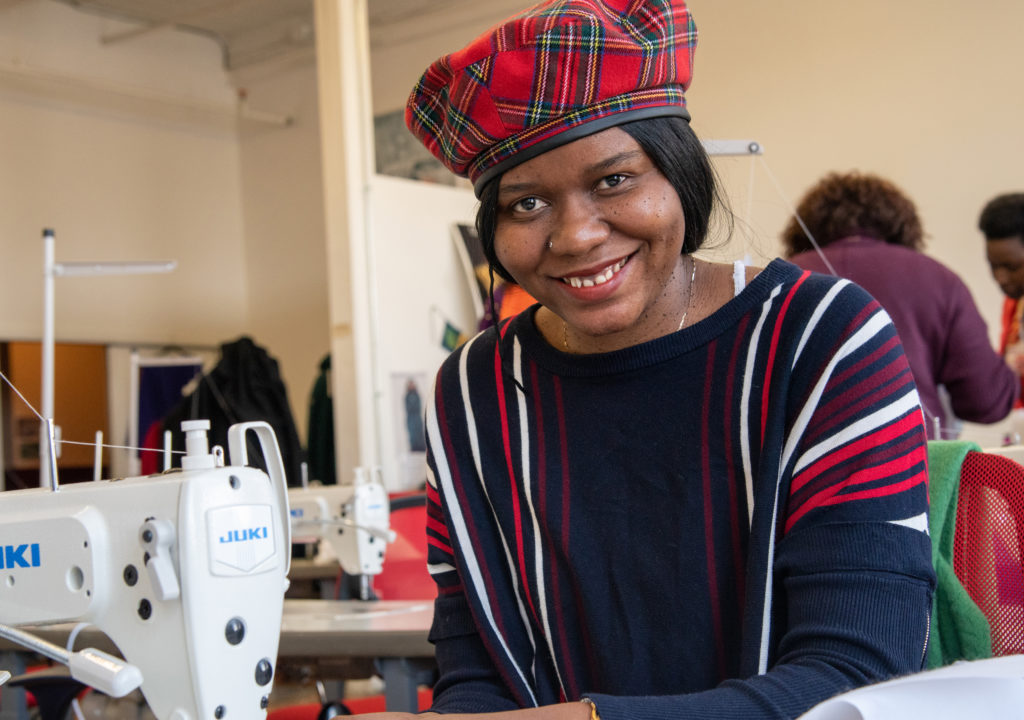
Common Threads of Maine in Westbrook continues its 12-week industrial sewing classes of 200-plus hours with more than $23,000 in support this year from the Start Up Scale Up grant program. Students also learn to prepare resumes and practice interviews for a job fair with local manufacturing businesses after they finish their training. Most students are hired within a month of completing the class. Photo Tom McPherson
Susan Flaherty Walsh and Whytne Crabtree had experience as teachers helping students translate their real-life experiences into credits to graduate high school. They had an idea for a business that would help other teachers, businesses, and homeschool centers design curriculum for Maine students.
But they didn’t have the confidence to pursue that idea until they turned to the Sunrise County Economic Council in Washington County earlier this year. They took a new online course offered by the council, called Pathways to Entrepreneurship, and used what they learned to launch an educational consulting service.
“These Pathways classes brought in real people, real Maine people,” Crabtree said. “We could have easily taken some course in California online and done that, but it wouldn’t really be as valuable to us, and we wouldn’t be where we are now if we had done that.”
MaineCF twice selected the Sunrise County Economic Council for a $25,000 Start Up Scale Up grant. The nonprofit used the first award to establish Pathways to Entrepreneurship 1.0 and 2.0 in 2020, and the series was so successful that the council applied for the grant in 2021 to run it a second time.
Denise Cilley, the council’s entrepreneurship program director, said she worried the audience would be small because no one would want to start a business during a pandemic. But more than 50 people signed up for the first course and more than 70 for second.
“COVID came up a lot,” Cilley said. “I think it resulted in better business plans because we certainly had a proof of concept to draw from. But never did I hear that folks were discouraged at all about starting their businesses or continuing them.”
Participants write a business plan and consult with an advisor. They discuss how to separate business and personal finances. They learn what resources are available when they need advice. They gain marketing strategies for social media. They even have the option to earn college credits for their coursework.
Even before the pandemic, Cilley wanted the classes to have a virtual component to reach more people in the rural county. The program attracted students from across the state, including incarcerated people who could not have taken the classes otherwise. Pathways to Entrepreneurship will remain online even when the council returns to hosting events in person.
“I advocated for leaving it just as it is, so we can continue to serve the people that we serve in a very flexible and effective way,” Cilley said. That accessibility was a key goal for the Start Up Scale Up grants.

Ignite Presque Isle received a grant from MaineCF's Start Up/Scale Up grant program to purchase furniture and equipment for a new co-workspace and conference rooms at the Northeastland Hotel. Photo courtesy Maine Development Foundation
Maggie Drummond-Bahl, MaineCF’s director of philanthropy, said the community foundation wanted to boost the reach of organizations that already were working with entrepreneurs in their own communities and help launch new programs to reach underserved entrepreneurs. Priority areas included applicants who supported people in rural communities or businesses led by women and people of color.
“When you’re an entrepreneur in a rural community, or you’re a woman or you are a person of color, you tend to get less investment,” Drummond-Bahl said. “Your networks are smaller. You have fewer mentors. So, we just knew that there were barriers that we could help address by trying to focus the resources where they can make the biggest difference.”
Walsh and Crabtree started Pathfinder Education Services this summer. In their first months, they helped a nonprofit align a basic scuba diving certification with the curriculum requirements for Maine high schoolers. Now, students who get that certificate can also get credits toward graduation, like one for physical education. They can also use their certificate to find work along Maine’s coast, such as scraping the bottoms of boats.
That result is exactly what the two women envisioned for their business, and they said they never would have launched without the support they found at SCEC. “We still wouldn’t have pushed the button if we thought we were alone."
Investments for Innovation
MaineCF awarded $425,000 through its Start Up Scale Up program in 2020-2021. The two-year initiative provided grants averaging $20,000 to nonprofit organizations and projects that could help start new businesses or grow existing businesses. Donors contributed nearly $185,000 more to 2021 grant awards through their donor-advised funds.
Grantees included:
- Black Owned Maine in Saco, to develop an entrepreneurship program for people who want tomaster African hair artistry while learning skills to become a successful business owner
- Ignite Presque Isle, to purchase furniture and equipment for its new coworking space and conference rooms at the downtown hub
- New England Arab American Organization in Portland, to launch an entrepreneurship program for women who are Arab American, immigrants, or refugees so they could gain skills, support, and knowledge about starting a small business
- Town of Monson, to expand the town’s coworking pilot program and evaluate options for a larger, permanent location.





